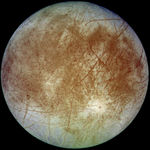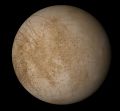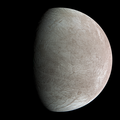Difference between revisions of "Europa"
(Added gallery.) |
(Added categories.) |
||
| Line 62: | Line 62: | ||
</gallery> | </gallery> | ||
| + | [[Category:Articles]] | ||
[[Category:Celestial bodies]] | [[Category:Celestial bodies]] | ||
[[Category:Natural satellites]] | [[Category:Natural satellites]] | ||
| + | [[Category:Satellites of Jupiter]] | ||
{{JupiterSat}} | {{JupiterSat}} | ||
{{SolarSystem}} | {{SolarSystem}} | ||
{{Nsat-Stub}} | {{Nsat-Stub}} | ||
Revision as of 02:54, 8 August 2024
Europa is one of Jupiter's four Galilean Moons. It is thought that there may be simple life, such as bacteria, on or under it's icy surface, and this was one of the contributing factors in NASA's decision to crash the Galileo Probe into Jupiter, out of fear that bacteria could contaminate the potential oceans of Europa. Europa's orbit is in a 1:2:4 resonance with Io and Ganymede.
Europa in Orbiter
Europa was introduced in Orbiter 2002 modeled as a sphere with a mass of 4.8×1022 kg and a radius of 1.565×106.
Orbiter versions and add-ons which include Europa as a body.
| Add-on | Source | Version | Author | Type | Release Date | Compatibility | Wiki article |
|---|---|---|---|---|---|---|---|
| Orbiter 2002 | O-F Resources | 020419 | martins | Orbiter Download | 19 April 2002 | Orbiter 2002 | |
See also
Europa as seen by the Juno spacecraft
| edit The Solar System | |
|---|---|
| Central star |
Sun (Sol) |
| Planets |
Mercury - Venus - Earth - Mars - Jupiter - Saturn - Uranus - Neptune |
| Natural satellites |
Moon - Phobos - Deimos - Io - Europa - Ganymede - Titan - more... |
| Add-ons |
Planets - Dwarf Planets - Small objects - Natural satellites - Alternative star systems |
 | This natural satellite related article is a stub. You can help Orbiterwiki by expanding it.
|



